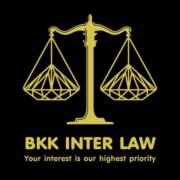Best Tax Lawyers in Don Mueang
Share your needs with us, get contacted by law firms.
Free. Takes 2 min.
List of the best lawyers in Don Mueang, Thailand
Thailand Tax Legal Questions answered by Lawyers
Browse our 4 legal questions about Tax in Thailand and read the lawyer answers, or ask your own questions for free.
- I am Swiss National received Social Securety from the USA year 2024 make arround 750.000Bath year . I single , leave in Rented Apartment 13 Years the moment.
- My Question is need to pay Tax on my Yearly Income Retirement Salary of 750000 Bath? Leave in a rented Apartment moment 13 years. i divorced for the past 25 years and am Single in Thailand Bangkok. have no other Income in my Savings Account, and I am living on... Read more →
-
Lawyer answer by Afe Babalola & Co. (Emmanuel Chambers)
If you are receiving U.S. Social Security benefits while living abroad, here are key points to consider regarding taxes and residency: - U.S. Taxes – As a U.S. income recipient, you may still owe U.S. taxes on your Social Security...
Read full answer - Retired living on social security income in Chiang mai
- Sir, I looked onto the tax chart where my income is at, 20%. I have a retirement OA visa that cannot earn any income while in Thailand. All my sources of income comes from SSI and a small annuity. I wire transfer money into a USD account and then do... Read more →
-
Lawyer answer by AD Legal Firm
Orders Nos. Por. 161 and Por. 162 of the Revenue Department, issued under Section 41, Paragraph 2 of the Revenue Code, stipulate that individuals required to pay tax based on overseas income are defined as follows: An individual who earns...
Read full answer - about the new tax law for foreigners
- I only have to pay taxes on the money I transfer to Thailand. How do I have to prove how much money I transfer? If I transfer let's say 1.000.000 Baht a year, how much do I have to pay for taxes if I paid already 130.000 Baht taxes in... Read more →
-
Lawyer answer by Lexiam Law
Only the income received overseas and/or in Thailand is subject to personal income tax. Transferred money is not subject to it but you have to declare the source and the purpose of transfer for it being able to be transferred...
Read full answer
Thailand Tax Legal Articles
Browse our 5 legal articles about Tax in Thailand written by expert lawyers.
- The Penalties Of Not Filing Your Income Tax Return As A Foreigner In Thailand
- Thailand has strict tax regulations that apply to both residents and non-residents. In recent years, the Thai Revenue Department has updated its policies on how both foreign and locally sourced income are taxed.For foreigners earning income from either of these sources, understanding these requirements has become more important than ever.... Read more →
- Legal Implications of Remote Work in Thailand
- Remote work, often referred to as telecommuting, has emerged as a dominant trend reshaping global employment landscapes. For Thailand, a country known for its digital nomad appeal and vibrant expat community, the rise of remote work brings unique legal, cultural, and operational considerations. Our comprehensive guide here explores the legal... Read more →
- Thai Legal Framework for Cryptocurrencies
- Technology, investment, and money have all been fundamentally altered by cryptocurrencies. Countries all throughout the globe struggle to design legal regimes that safeguard consumers while fostering innovation as these digital assets develop. Thailand distinguishes itself in this sense as it has one of the most thorough regulatory frameworks regarding cryptocurrencies... Read more →
About Tax Law in Don Mueang, Thailand
Don Mueang is a district located in the northern part of Bangkok, Thailand. As with the rest of Thailand, tax law in Don Mueang is primarily governed by national statutes, particularly the Revenue Code of Thailand. This framework regulates the collection of income tax, value-added tax (VAT), specific business tax, corporate tax, and duties such as stamp duty. Residents and businesses in Don Mueang must comply with these laws, which are administered and enforced by the Thai Revenue Department and local district offices. Tax law in Don Mueang is influenced by both national provisions and specific regional administrative procedures applied by local authorities.
Why You May Need a Lawyer
Navigating the complexities of tax law can be challenging, especially when managing business operations or sizable personal assets. Legal counsel can be valuable in scenarios such as:
- Setting up a company or registering a business in Don Mueang.
- Managing tax compliance and filing accurate returns to avoid penalties.
- Handling tax audits or investigations initiated by the Revenue Department.
- Dealing with disputes regarding tax assessments or appeals against tax decisions.
- Assisting with international transactions and understanding double taxation agreements.
- Structuring investments or inheritances to be tax-efficient.
- Advising on proper VAT registration and obligations for different types of businesses.
In all such cases, a lawyer will help you understand your legal rights and responsibilities, ensure compliance, and represent you in negotiations or proceedings with tax authorities.
Local Laws Overview
Tax laws relevant to Don Mueang adhere closely to national Thai tax regulations. Here are key components you should be aware of:
- Personal Income Tax: Thai residents in Don Mueang are taxed on their worldwide income, while non-residents are taxed only on income sourced from Thailand.
- Corporate Income Tax: Companies registered in Don Mueang are generally subject to the standard corporate tax rate of 20 percent, subject to some exceptions for small and medium-sized enterprises.
- Value Added Tax (VAT): The standard VAT rate in Thailand is 7 percent. Businesses with an annual turnover exceeding the specified threshold must register for VAT.
- Withholding Tax: Certain payments, such as salaries, service fees, or rents, are subject to withholding tax, which must be deducted at the source.
- Property and Land Taxes: Owners of property in Don Mueang must comply with land and building tax obligations.
- Double Taxation Agreements (DTA): Thailand has several DTAs in place to help prevent double taxation for international business or personal affairs.
- Tax Filing Deadlines: Missing deadlines can result in significant penalties or fines, so it is crucial to be aware of the local and national timelines.
Local regulations may affect the procedures for filing documents, paying taxes, and resolving disputes with authorities, making it important to stay informed about regional administrative requirements specific to Don Mueang.
Frequently Asked Questions
What taxes do individuals residing in Don Mueang have to pay?
Individuals are typically subject to personal income tax, which applies to worldwide income for residents. Other potential taxes include property tax if you own land or a house.
Do I need to register for VAT if I operate a business in Don Mueang?
You must register for VAT if your business turnover exceeds the legal threshold, generally two million baht per year. Some types of businesses may be exempt.
How do I submit a tax return in Don Mueang?
Tax returns can be submitted online through the Revenue Department's portal or in person at the local district office. Ensure you keep records and receipts for all your transactions.
What happens if I miss a tax deadline?
Missing tax deadlines may result in fines and penalties. In some cases, interest may also accrue on outstanding tax liabilities.
Are expatriates living in Don Mueang subject to Thai tax?
Yes, expatriates are taxed on income derived from Thai sources. If they qualify as tax residents, they may also be taxed on worldwide income.
What is the corporate income tax rate in Don Mueang?
The standard corporate income tax rate is 20 percent, with possible reductions for small and medium-sized enterprises depending on specific criteria.
How can I appeal a tax assessment issued in Don Mueang?
If you disagree with a tax assessment, you can file an appeal with the local Revenue Department office. Legal representation is recommended for complex disputes.
What records should I keep for tax purposes?
You should retain financial statements, invoices, contracts, and other documents related to your income and expenses for at least five years, as required by Thai law.
What are the penalties for tax evasion in Don Mueang?
Tax evasion is a serious offense, leading to hefty fines, back taxes, and possible criminal charges. Authorities may also seize assets in severe cases.
How does the Double Taxation Agreement apply in Don Mueang?
Double Taxation Agreements help prevent individuals or companies from being taxed twice on the same income in Thailand and another country. Check if your country has a DTA with Thailand and consult a legal professional for guidance.
Additional Resources
If you require more information or support, the following resources may be helpful:
- Thai Revenue Department: Responsible for administering and collecting taxes in Thailand, with branch offices serving Don Mueang.
- Bangkok Metropolitan Administration: Provides local administrative guidance about property and land tax matters in Don Mueang.
- Law Society of Thailand: Directory of licensed legal professionals who can provide advice on tax issues.
- Thai Chamber of Commerce and Board of Trade: Useful for business owners seeking guidance on compliance and legal obligations.
You may also consult with local accountants and certified tax advisers who work closely with lawyers on tax matters.
Next Steps
If you find yourself needing legal assistance with tax matters in Don Mueang, take the following actions:
- Gather all relevant documentation, including tax returns, financial records, and correspondence from tax authorities.
- Contact a licensed tax lawyer or law firm with experience in Thai tax law and familiarity with local Don Mueang procedures.
- Arrange an initial consultation to explain your situation and get preliminary advice on legal steps and potential outcomes.
- Work closely with your lawyer to ensure all filings and appeals are completed accurately and on time.
- Stay informed about upcoming deadlines and any changes in local or national tax regulations.
Prompt action and professional guidance are key to resolving tax-related issues efficiently and minimizing any negative consequences.
Lawzana helps you find the best lawyers and law firms in Don Mueang through a curated and pre-screened list of qualified legal professionals. Our platform offers rankings and detailed profiles of attorneys and law firms, allowing you to compare based on practice areas, including Tax, experience, and client feedback.
Each profile includes a description of the firm's areas of practice, client reviews, team members and partners, year of establishment, spoken languages, office locations, contact information, social media presence, and any published articles or resources. Most firms on our platform speak English and are experienced in both local and international legal matters.
Get a quote from top-rated law firms in Don Mueang, Thailand — quickly, securely, and without unnecessary hassle.
Disclaimer:
The information provided on this page is for general informational purposes only and does not constitute legal advice. While we strive to ensure the accuracy and relevance of the content, legal information may change over time, and interpretations of the law can vary. You should always consult with a qualified legal professional for advice specific to your situation.
We disclaim all liability for actions taken or not taken based on the content of this page. If you believe any information is incorrect or outdated, please contact us, and we will review and update it where appropriate.









